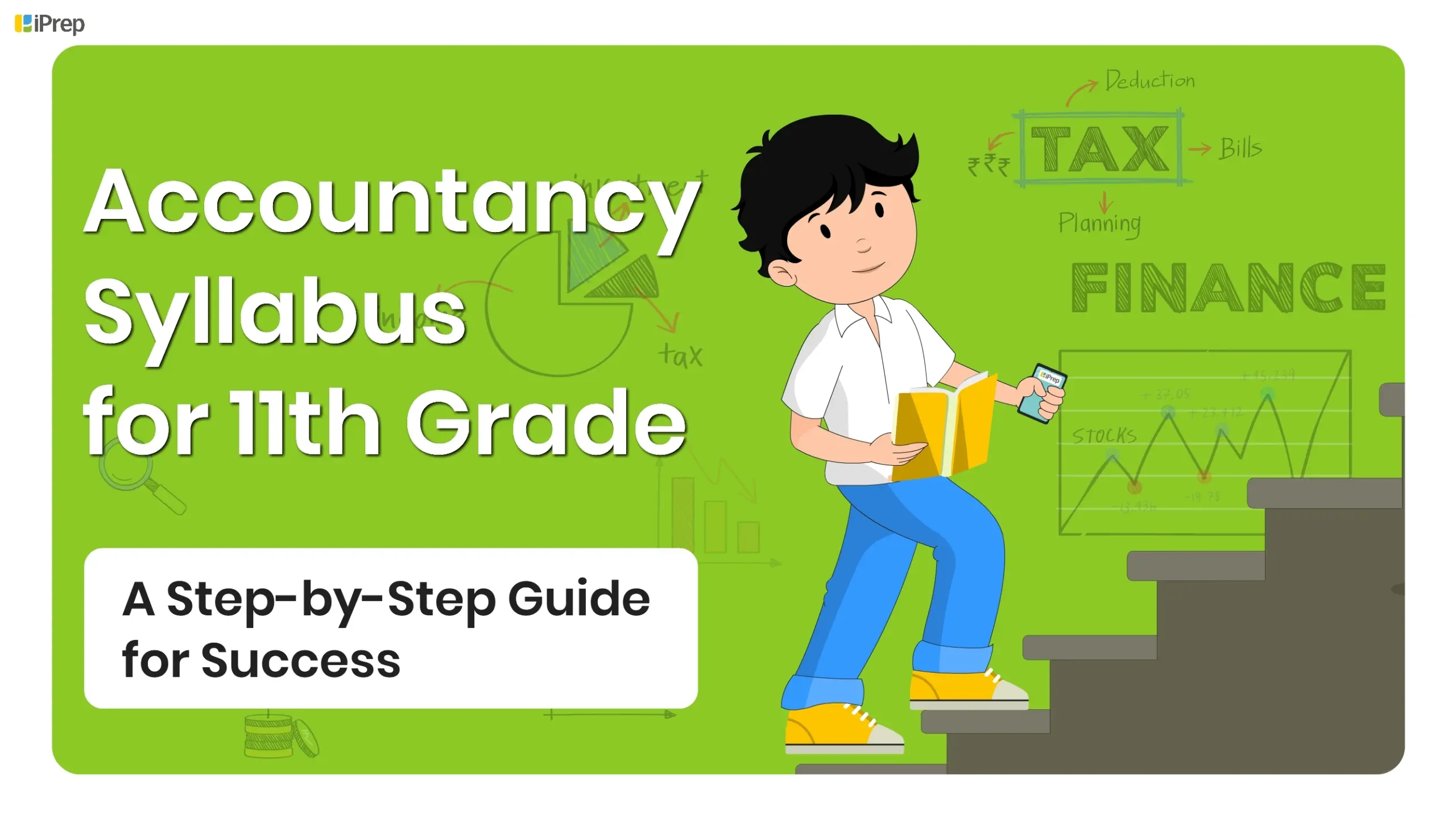Accountancy Syllabus for 11th Grade: A Step-by-Step Guide for Success

iPrep can help you navigate the accountancy syllabus for 11th grade with ease
When I first encountered the Accountancy syllabus for 11th grade, I was filled with a mix of anxiety and apprehension. Like many others, I had several misconceptions about accountancy: it was only about math, it was too complex, and it was impossible to grasp without an inherent knack for numbers. These thoughts scared me and made the subject seem like an insurmountable mountain. However, I soon discovered that every hurdle is scalable when you break it down and tackle one thing at a time.
The 11th grade is a crucial year, serving as the foundation for understanding the core concepts of accountancy. Getting a firm grasp on these basics is essential for future success in this field. Through my journey, I learned valuable lessons and strategies that helped me navigate the accountancy syllabus for 11th grade more effectively.
In this blog, I will share my insights and experiences to help you tackle the Class 11 Accountancy syllabus with confidence. But first, let’s delve into the syllabus in detail. Stay with me, and I’ll reveal a secret that was instrumental in my success.
Introduction to Accountancy Syllabus for 11th Grade
Accountancy is designed to introduce students to the principles and practices that form the bedrock of financial management. The syllabus covers various aspects of financial accounting, including bookkeeping, financial statements, and the regulatory framework governing accounting practices. This subject not only imparts theoretical knowledge but also emphasizes practical applications, making it highly relevant and engaging.
CBSE Class 11 Accountancy Course Structure
| Units | Marks | |
| Part A: Financial Accounting-1 | ||
| Unit-1: Theoretical Framework | 12 | |
| Unit-2: Accounting Process | 44 | |
| Part B: Financial Accounting-II | ||
| Unit-3: Financial Statements of Sole Proprietorship | 24 | |
| Part C: Project Work | 20 | |
CBSE Accountancy Syllabus pdf for Class 11 and Class 12
CBSE Accountancy Syllabus for 11th Grade
| PART A: FINANCIAL ACCOUNTING – I |
| Unit-1: Theoretical Frame Work |
| Units/Topics |
| Introduction to Accounting· Accounting- concept, meaning, as a source of information, objectives, advantages and limitations, types of accounting information; users of accounting information and their needs. Qualitative Characteristics of Accounting Information. Role of Accounting in Business. Basic Accounting Terms- Entity, Business Transaction, Capital, Drawings. Liabilities (Non Current and Current). Assets (Non Current, Current); Expenditure (Capital and Revenue), Expense, Revenue, Income, Profit, Gain, Loss, Purchase, Sales, Goods, Stock, Debtor, Creditor, Voucher, Discount (Trade discount and Cash Discount) Theory Base of Accounting· Fundamental accounting assumptions: GAAP: Concept· Basic Accounting Concept : Business Entity, Money Measurement, Going Concern, Accounting Period, Cost Concept, Dual Aspect, Revenue Recognition, Matching, Full Disclosure, Consistency, Conservatism,- Materiality and Objectivity- System of Accounting. Basis of Accounting: cash basis and accrual basis- Accounting Standards: Applicability of Accounting Standards (AS) and Indian Accounting Standards (IndAS)- Goods and Services Tax (GST): Characteristics and Advantages. |
| Unit-2: Accounting Process |
| Units/Topics |
| Recording of Business Transactions Voucher and Transactions: Source documents and Vouchers, Preparation of Vouchers, Accounting Equation Approach: Meaning and Analysis, Rules of Debit and Credit. Recording of Transactions: Books of Original Entry- Journal Special Purpose books: Cash Book: Simple, cash book with bank column and petty cashbook, Purchases book, Sales book, Purchases return book, Sales return book, Journal proper Note: Including trade discount, freight and cartage expenses for simple GST calculation. Ledger: Format, Posting from journal and subsidiary books, Balancing of accounts Bank Reconciliation Statement: Need and preparation, Bank Reconciliation Statement Depreciation, Provisions and Reserves Depreciation: Meaning, Features, Need, Causes, factors- Other similar terms: Depletion and Amortisation Methods of Depreciation: i. Straight Line Method (SLM) ii. Written Down Value Method (WDV) Note: Excluding change of method Difference between SLM and WDV; Advantages of SLM and WDV Method of recording depreciation- a. Charging to asset accounting b. Creating provision for depreciation/accumulated depreciation accountTreatment of disposal of assetProvisions, Reserves, Difference Between Provisions and Reserves. Types of Reserves: Revenue reserve, Capital reserve, General reserve, Specific reserve, Secret Reserve Difference between capital and revenue reserve Trial balance and Rectification of Errors‘ Trial balance: objectives, meaning and preparation (Scope: Trial balance with balance method only) Errors: classification-errors of omission, commission, principles, and compensating; their effect on Trial Balance. Detection and rectification of errors- (i). Errors which do not affect trial balance (ii). Errors which affect trial balance Preparation of suspense account. |
| Part B: Financial Accounting – II |
| Unit 3: Financial Statements of Sole Proprietorship |
| Units/Topics |
| Financial Statements: Meaning, objectives and importance; Revenue and Capital Receipts; Revenue and Capital Expenditure; Deferred Revenue expenditure. Opening journal entry. Trading and Profit and Loss Account: Gross Profit, Operating profit and Net profit. Preparation. Balance Sheet: need, grouping and marshalling of assets and liabilities. Preparation. Adjustments in preparation of financial statements with respect to closing stock, outstanding expenses, prepaid expenses, accrued income, income received in advance, depreciation, bad debts, provision for doubtful debts, provision for discount on debtors, Abnormal loss, Goods taken for personal use/staff welfare, interest on capital and managers commission. Preparation of Trading and Profit and Loss account and Balance Sheet of a sole proprietorship with adjustments. |
Learning Objectives for Accountancy Syllabus for 11th Grade
- To familiarise the students with accounting as an information system;
- To acquaint the students with basic concepts of accounting and accounting standards;
- To develop the skills of using accounting equation in processing business transactions;
- To develop an understanding about recording of business transactions and preparation of
- financial statements;
- To enable the students with accounting for reconstitution of partnership firms;
- To enable the students to understand and analyse the financial statements; and
- To familiarise students with the fundamentals of computerised system of accounting
NCERT textbook for Accountancy for Class 11 pdf
Mastering Accountancy Syllabus for 11th Grade with the iPrep App
When I first started studying Accountancy, I found it incredibly challenging. The concepts were complex, and the vast amount of information felt overwhelming. Traditional study methods weren’t working for me, and I began to worry about keeping up with the syllabus and performing well in exams. That’s when I discovered the iPrep app, and it completely changed my approach to learning Accountancy. iPrep made learning not only manageable but also enjoyable, transforming my struggles into strengths. Let me share how each feature of iPrep helped me master Accountancy.
Interactive Content
iPrep’s interactive videos, animations, and infographics transformed my understanding of accounting concepts. For example, understanding the process of preparing financial statements became much easier with visual aids. The interactive elements kept me engaged and made complex ideas more accessible.
Detailed Notes and Summaries
The detailed notes and summaries provided by iPrep were a game-changer for me. Each chapter was broken down into easy-to-understand sections. I could quickly review the summaries before tests to reinforce my understanding. These were particularly helpful during revision periods when time was short, and I needed concise, clear information.
Practice and Assessments
Regular practice tests on iPrep were crucial in testing my knowledge and tracking my progress. The variety of practice papers, including past exam papers, gave me a real feel of the actual exams. This practice was invaluable in identifying my weak areas. By regularly taking these assessments, I became more comfortable with the exam format and the types of questions I might face.
Progress Tracking
One of the best features of iPrep was its ability to track my progress over time. Seeing my performance charts was incredibly motivating. I could see how much I had improved and which areas still needed work. This feature helped me stay on track and adjust my study plan as needed. It provided a clear picture of my strengths and weaknesses, allowing me to focus my efforts more effectively.
Anytime, Anywhere Learning
iPrep’s flexibility allowed me to study at my own pace, whenever and wherever it was convenient for me. Whether I was on the bus, waiting for an appointment, or relaxing at home, I could access my study materials and continue learning. This convenience meant I could make the most of my time and integrate studying seamlessly into my daily routine.
Learn more:
Commerce Syllabus for 11th and 12th: The Ultimate Guide
Conclusion
Understanding that 11th grade is foundational, it is crucial to get a firm grasp on the core concepts to ensure future success. Throughout my journey, I learned valuable lessons and strategies that helped me navigate the subject more effectively. The iPrep app played a significant role in making my study process manageable and even enjoyable. Remember, the key to mastering accountancy lies in consistent practice, thorough understanding, and effective use of available resources. With the right approach and mindset, every challenge becomes an opportunity to learn and grow.



